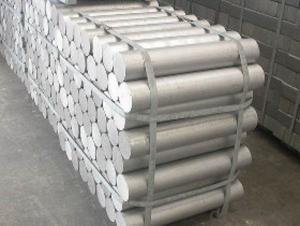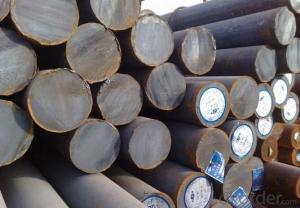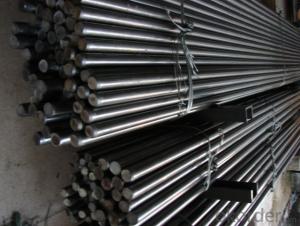Carbon Steel Structural Black or Galvanized Round Bar
- Loading Port:
- China main port
- Payment Terms:
- TT OR LC
- Min Order Qty:
- 30 m.t.
- Supply Capability:
- 10000 m.t./month
OKorder Service Pledge
OKorder Financial Service
You Might Also Like
Item specifice
Carbon Steel Structural Black or Galvanized Round Bar
Product Information:
1.Description:Carbon Steel Rod/Carbon Steel Bar,carbon steel rod,carbon steel shaft,mild steel bar, mild steel shaft,ms bar
2.Specification:
ASTM 1005,1006,1008,1010,1015,1020,1025,1030,1035,1040,1045,1050,1055,1060,1065,1070,1080,1084,
1016,1022
DIN Ck10,Ck15,Ck22,Ck25,Ck30,Ck35,Ck40,Ck45,Ck50, 30Mn4,40Mn4
BS 040A04,095M15,045M10,080A40,045M10,080M50
Standard GB/T799,ASTM A29,A108,A321,A575,BS970,DIN1652,JIS G4051
3.Section shape:Round
4.LengthAs your required
5.Application:Carbon steel rod applies to chemical industry, shipping industry,
manufacturing industry,construction,decorate Industry,electric power,
pump shafts, sanitary wares,furniture handles,boiler,high temperature
resistant,low temperature resistant, corrosion resistant.
Product Overviews:
| Product Name | Typical Grades | Diameter(mm) | Standard adopted |
| Carbon Steel | 20 (1020/S20C/C22) | Ø16-Ø300 | GB/SAE/JIS/DIN |
| 40 (1040/S40C/C40) | |||
| 45 (1045/S45C/C45) | |||
| Bearing Steel | GCr9 (51100/SUJ1) | Ø12-Ø250 | |
| GCr15 (52100/SUJ2/100Gr6) | |||
| GCr9SiMn (A485-Gr.1/SUJ3) | |||
| Cr-Mo Steel | 20Cr (5120/SCr420H/20Cr4) | Ø12-Ø250 | |
| 40Cr (5140/SCr440/41Cr4) | |||
| 42CrMo(4140/SCM440/42CrMo4) | |||
| Gear Steel | 20CrNiMo | Ø16-Ø600 | |
| 20CrMn(5115/SMnC420/20MnCr5) | |||
| 20CrNiMo(8620/SNCM220/20CrMiMo2) |
Product Show:

Our Advantages:
· Industry experience over 20 years.
· Shipment of goods -More than 70 countries worldwide.
· The most convenient transport and prompt delivery.
· Competitive price with best service.
· High technical production line with top quality products.
· High reputation based on best quality products.
With our experienced, enthusiastic and dynamic staffs, we assure to bring you the products with best quality, reasonable prices and good after-sales services under the motto: Friends First, Business After.
Communication, Experience, Expertise and Best efforts are our Promises to you.
- Q:How does special steel perform under extreme cold conditions?
- Special steel performs well under extreme cold conditions due to its high strength, toughness, and resistance to brittleness. It retains its mechanical properties even at low temperatures, making it suitable for various applications in sub-zero environments.
- Q:What are the different methods of surface coloring for special steel?
- Special steel can be colored using several different methods, each with its own purpose and effect. Some common methods include: 1. Heat treatment: This technique involves subjecting the steel to high temperatures, which causes controlled oxidation on the surface. The result is a layer of colored oxide, ranging from golden yellow to deep blue or black. Heat treatment also enhances hardness and corrosion resistance. 2. Electroplating: By immersing the steel in an electrolyte bath with a metal salt solution and passing an electric current through it, metal ions adhere to the surface, creating a thin layer of the desired metal coating. This method allows for a wide range of colors and finishes. 3. Chemical coloring: This process involves using chemical solutions to change the surface color of special steel. Treating the steel with a solution containing specific chemicals, such as oxidizing agents or dyes, can produce various colors and finishes, often used for decorative purposes. 4. Physical Vapor Deposition (PVD): PVD is a technique that deposits thin layers of material onto the steel surface. A solid material is vaporized using a high-energy source and then condensed onto the steel. This allows for the deposition of different materials, resulting in various colors and finishes. PVD coatings are durable, wear-resistant, and aesthetically appealing. 5. Laser marking: Laser marking uses a focused laser beam to create permanent markings or colors on the steel surface. By adjusting laser parameters, such as power and speed, different colors and effects can be achieved. Laser marking is ideal for branding, identification, or decorative purposes due to its precision and ability to create intricate designs. The choice of surface coloring method for special steel depends on factors like desired color, durability, functionality, and cost considerations. Each method has its advantages and limitations, allowing for customization based on specific requirements and preferences.
- Q:How does special steel contribute to the safety of infrastructure?
- Special steel plays a crucial role in enhancing the safety of infrastructure in various ways. Firstly, it offers exceptional strength and durability, allowing for the construction of robust and resilient structures. Whether it is used in bridges, buildings, or tunnels, special steel provides the necessary structural integrity to withstand extreme loads, such as heavy traffic, strong winds, seismic activities, or even potential terrorist attacks. Moreover, special steel possesses excellent corrosion resistance properties, making it suitable for infrastructure projects exposed to harsh environmental conditions. By preventing rust and decay, it extends the lifespan of structures and reduces the need for costly maintenance and repairs. This is especially important in coastal areas, where infrastructure is subjected to the corrosive effects of saltwater. In addition to its strength and corrosion resistance, special steel also offers exceptional fire resistance. It has a high melting point, which allows it to maintain its structural integrity under extreme temperatures. This characteristic is critical for infrastructure safety, as it provides additional time for evacuation and emergency response in case of a fire. Furthermore, special steel can contribute to the safety of infrastructure by enabling innovative design solutions. Its versatility allows for the creation of complex and efficient structures, such as long-span bridges or skyscrapers. These designs often incorporate special steel components, such as high-strength beams or columns, which enhance the overall stability and safety of the infrastructure. Overall, special steel's exceptional strength, corrosion resistance, fire resistance, and design flexibility make it an essential material for ensuring the safety and reliability of infrastructure. By utilizing special steel in construction projects, engineers and architects can create structures that can withstand various challenges, ultimately protecting the lives and well-being of the people who utilize them.
- Q:Can special steel be cast?
- Yes, special steel can be cast.
- Q:What are the key alloying elements used in special steel?
- The specific application and desired properties determine the key alloying elements used in special steel. Some commonly used alloying elements in special steel are chromium, nickel, molybdenum, vanadium, tungsten, and cobalt. To enhance the steel's hardness, wear resistance, and corrosion resistance, chromium is often added. Nickel, on the other hand, increases the steel's strength, toughness, and corrosion resistance. Molybdenum is commonly used to improve the steel's high-temperature strength, resistance to creep, and resistance to corrosion by certain chemicals. Vanadium is added to increase the steel's strength, toughness, and wear resistance, especially at high temperatures. Tungsten is another element used to enhance the steel's high-temperature strength and wear resistance. Cobalt, on the other hand, is often added to improve the steel's strength and toughness, particularly at elevated temperatures. These alloying elements are carefully chosen and added in specific proportions to achieve the desired properties for various applications, including aerospace, automotive, energy, and tooling industries. By incorporating these alloying elements, special steel can be customized to meet specific performance requirements, making it suitable for a wide range of demanding applications.
- Q:Can special steel be used in the telecommunications equipment manufacturing industry?
- Yes, special steel can be used in the telecommunications equipment manufacturing industry. Special steel, known for its exceptional strength, durability, and resistance to corrosion, can be utilized in the production of various telecommunications equipment such as antennas, satellites, transmission towers, and optical fiber cables. Its properties make it ideal for withstanding harsh environmental conditions, ensuring the longevity and reliability of telecommunications infrastructure.
- Q:Can special steel be used for making oil and gas industry components?
- Yes, special steel can be used for making oil and gas industry components. Special steels, such as stainless steel and alloy steel, are often preferred in the oil and gas industry due to their exceptional mechanical properties, corrosion resistance, and high temperature resistance. These components are exposed to harsh operating conditions, including corrosive environments, extreme temperatures, and high pressures. Special steels are specifically designed to withstand these conditions and maintain their integrity and performance over time. The use of special steels in the oil and gas industry ensures the reliability, durability, and safety of critical components, such as valves, pipes, fittings, and drilling equipment.
- Q:What are the specific requirements for special steel used in the chemical reactor industry?
- The special steel used in the chemical reactor industry can have varying specific requirements depending on the application and the chemicals being processed. However, there are generally expected requirements for this type of steel. First and foremost, the steel must possess outstanding resistance to corrosion. Chemical reactors often handle highly corrosive substances, such as acids, alkalis, and reactive chemicals. Hence, the steel must be able to withstand the corrosive effects of these substances to maintain the integrity and durability of the reactor. Secondly, the steel should exhibit resistance to high temperatures. Chemical reactions often require elevated temperatures to facilitate desired transformations. Therefore, the steel used in these reactors must be capable of enduring these high temperatures without compromising its structural integrity or experiencing significant deformation. Furthermore, the steel should possess favorable mechanical properties, including high strength and toughness. The reactor may undergo high pressure and mechanical stress during operation, so the steel needs to be able to withstand these conditions without failure. Additionally, the steel used in chemical reactors should be easily weldable and formable. This allows for convenient fabrication and construction of the reactor, ensuring a reliable and efficient manufacturing process. Moreover, the steel should have low levels of impurities, such as sulfur and phosphorus. These impurities can have adverse effects on the steel's corrosion resistance and mechanical properties. Therefore, the steel must adhere to stringent quality standards to ensure its suitability for use in the chemical reactor industry. In conclusion, the specific requirements for special steel used in the chemical reactor industry encompass excellent corrosion resistance, high temperature resistance, favorable mechanical properties, weldability, formability, and low impurity levels. Meeting these requirements is crucial to guarantee the safety, reliability, and efficiency of chemical reactors in various industrial processes.
- Q:Can special steel be used in the automotive industry?
- Yes, special steel is commonly used in the automotive industry for various applications such as engine components, chassis parts, and suspension systems. Its high strength, durability, and resistance to corrosion make it ideal for improving safety, performance, and overall quality of automobiles.
- Q:How does special steel perform in cryogenic conditions?
- Special steel performs well in cryogenic conditions due to its low thermal expansion, high strength, and good toughness. It can withstand extreme cold temperatures without becoming brittle or losing its structural integrity, making it suitable for applications such as cryogenic storage tanks, aerospace components, and superconducting magnets.
1. Manufacturer Overview |
|
|---|---|
| Location | |
| Year Established | |
| Annual Output Value | |
| Main Markets | |
| Company Certifications | |
2. Manufacturer Certificates |
|
|---|---|
| a) Certification Name | |
| Range | |
| Reference | |
| Validity Period | |
3. Manufacturer Capability |
|
|---|---|
| a)Trade Capacity | |
| Nearest Port | |
| Export Percentage | |
| No.of Employees in Trade Department | |
| Language Spoken: | |
| b)Factory Information | |
| Factory Size: | |
| No. of Production Lines | |
| Contract Manufacturing | |
| Product Price Range | |
Send your message to us
Carbon Steel Structural Black or Galvanized Round Bar
- Loading Port:
- China main port
- Payment Terms:
- TT OR LC
- Min Order Qty:
- 30 m.t.
- Supply Capability:
- 10000 m.t./month
OKorder Service Pledge
OKorder Financial Service
Similar products
New products
Hot products
Related keywords






























